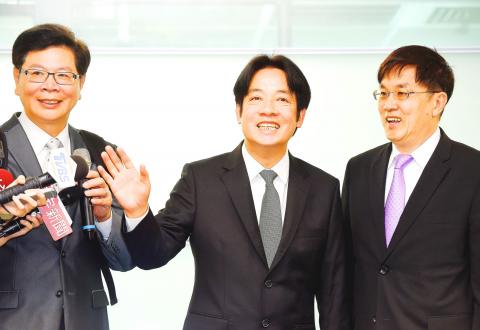Former premier William Lai (賴清德) yesterday registered to run in the Democratic Progressive Party’s (DPP) presidential primary, saying that he could shoulder the responsibility of leading Taiwan in defending itself.
Lai, who stepped down as premier in January following the party’s losses in the nine-in-one elections on Nov. 24 last year, said that calls from grassroots DPP supporters led him to contend for the party’s nomination.
The DPP would find itself in an even more precarious position in next year’s presidential election than in the 2008 race, particularly after the party’s heavy losses in the local elections, Lai said.

Photo: Huang Yao-cheng, Taipei Times
DPP supporters are concerned that losing the presidency and a number of legislative seats would put the nation’s sovereignty and democracy at risk, he said.
As a result, many voices have been urging him to “take up the responsibility,” he added.
The legislative by-elections this month showed that the DPP’s base is strong, but Lai said he believes that the party remains in a challenging situation.
Moreover, Chinese President Xi Jinping (習進平) is pushing for the annexation of Taiwan, “forcing Taiwan to accept the surrender-like ‘one country, two systems,’” he said.
The Chinese Nationalist Party (KMT) has responded to pressure from China with a proposal to sign a peace treaty, but Lai said that Tibet’s experience with Beijing has taught him that a treaty would not prevent China from trying to annex Taiwan.
“Taiwan will not become a second Hong Kong, a second Tibet,” he said, adding that cross-strait relations are what make next year’s elections so critical.
Lai said that he made his decision to run after the legislative by-elections revealed a crisis in the DPP.
DPP Chairman Cho Jung-tai (卓榮泰) specifically asked him to “stand in the front lines” during the by-elections, Lai said, adding that the opportunity put him in touch with many people and allowed him to gauge the depth of their concern.
He said that he came to his decision over the past two days.
Lai said he informed Presidential Office Secretary-General Chen Chu (陳菊) prior to his registration and asked her to relay his decision to President Tsai Ing-wen (蔡英文), who last month in an interview with CNN announced her intention to seek re-election.
Asked whether his decision would cause division in the party, Lai said that the DPP has a primary process that is democratic, not divisive.
If Tsai wins the primary, she would have his support, Lai added.
The president yesterday posted on Facebook that she would register for the DPP primary some time this week.
The president would register for the primary before visiting the Pacific island countries of Palau, Nauru and the Marshall Islands, Presidential Office spokesman Xavier Chang (張惇涵) said.
Tsai is to visit Palau on Thursday to Saturday and Nauru on March 24 and 25, before arriving in the Marshall Islands on March 26 for the first-ever Pacific Women Leaders’ Coalition Conference, an itinerary released by the Ministry of Foreign Affairs last week showed.
Additional reporting by CNA

CHAOS: Iranians took to the streets playing celebratory music after reports of Khamenei’s death on Saturday, while mourners also gathered in Tehran yesterday Iranian Supreme Leader Ayatollah Ali Khamenei was killed in a major attack on Iran launched by Israel and the US, throwing the future of the Islamic republic into doubt and raising the risk of regional instability. Iranian state television and the state-run IRNA news agency announced the 86-year-old’s death early yesterday. US President Donald Trump said it gave Iranians their “greatest chance” to “take back” their country. The announcements came after a joint US and Israeli aerial bombardment that targeted Iranian military and governmental sites. Trump said the “heavy and pinpoint bombing” would continue through the week or as long

TRUST: The KMT said it respected the US’ timing and considerations, and hoped it would continue to honor its commitments to helping Taiwan bolster its defenses and deterrence US President Donald Trump is delaying a multibillion-dollar arms sale to Taiwan to ensure his visit to Beijing is successful, a New York Times report said. The weapons sales package has stalled in the US Department of State, the report said, citing US officials it did not identify. The White House has told agencies not to push forward ahead of Trump’s meeting with Chinese President Xi Jinping (習近平), it said. The two last month held a phone call to discuss trade and geopolitical flashpoints ahead of the summit. Xi raised the Taiwan issue and urged the US to handle arms sales to

BIG SPENDERS: Foreign investors bought the most Taiwan equities since 2005, signaling confidence that an AI boom would continue to benefit chipmakers Taiwan Semiconductor Manufacturing Co’s (TSMC, 台積電) market capitalization swelled to US$2 trillion for the first time following a 4.25 percent rally in its American depositary receipts (ADR) overnight, putting the world’s biggest contract chipmaker sixth on the list of the world’s biggest companies by market capitalization, just behind Amazon.com Inc. The site CompaniesMarketcap.com ranked TSMC ahead of Saudi Aramco and Meta Platforms Inc. The Taiwanese company’s ADRs on Tuesday surged to US$385.75 on the New York Stock Exchange, as strong demand for artificial intelligence (AI) applications led to chip supply constraints and boost revenue growth to record-breaking levels. Each TSMC ADR represents

State-run CPC Corp, Taiwan (CPC, 台灣中油) yesterday said that it had confirmed on Saturday night with its liquefied natural gas (LNG) and crude oil suppliers that shipments are proceeding as scheduled and that domestic supplies remain unaffected. The CPC yesterday announced the gasoline and diesel prices will rise by NT$0.2 and NT$0.4 per liter, respectively, starting Monday, citing Middle East tensions and blizzards in the eastern United States. CPC also iterated it has been reducing the proportion of crude oil imports from the Middle East and diversifying its supply sources in the past few years in response to geopolitical risks, expanding